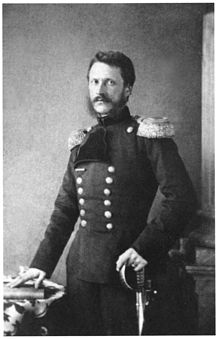Our website is made possible by displaying online advertisements to our visitors.
Please consider supporting us by disabling your ad blocker.
Alexandru Ioan Cuza
You can help expand this article with text translated from the corresponding article in Romanian. (February 2021) Click [show] for important translation instructions.
|
This article needs additional citations for verification. (June 2015) |
| Alexandru Ioan Cuza | |
|---|---|
 Photograph by Carol Szathmari, 1859 | |
| Domnitor of Romania | |
| Reign | 5 February 1862 – 23 February 1866 |
| Predecessor | Himself as Prince of Moldavia and Wallachia |
| Successor | Carol I |
| Prime ministers | Full list |
| Prince of Moldavia | |
| Reign | 5 January 1859 – 5 February 1862 |
| Predecessor | Grigore Alexandru Ghica |
| Successor | Himself as Domnitor of Romania |
| Prince of Wallachia | |
| Reign | 24 January 1859 – 5 February 1862 |
| Predecessor | Barbu Dimitrie Știrbei |
| Successor | Himself as Domnitor of Romania |
| Born | 20 March 1820 Bârlad, Moldavia |
| Died | 15 May 1873 (aged 53) Heidelberg, Baden, Germany |
| Burial | |
| Spouse | Elena Rosetti |
| Issue | Sașa Cuza Dimitrie Cuza |
| House | Cuza |
| Father | Ioan Cuza |
| Mother | Sultana Cozadini |
| Religion | Eastern Orthodoxy |
| Signature |  |
Alexandru Ioan Cuza (pronounced [alekˈsandru iˈo̯aŋ ˈkuza] ⓘ, or Alexandru Ioan I, also Anglicised as Alexander John Cuza; 20 March 1820 – 15 May 1873) was the first domnitor (prince) of the Romanian Principalities through his double election as Prince of Moldavia on 5 January 1859 and Prince of Wallachia on 24 January 1859, which resulted in the unification of the two states. He was a prominent figure of the Moldavian Revolution of 1848. Following his double election, he initiated a series of reforms that contributed to the modernization of Romanian society and of state structures.
As ruler of the Romanian Principalities, he supported a political and diplomatic activity for the recognition of the union of Moldavia and Wallachia by the suzerain Ottoman Empire and achieved constitutional and administrative unity between Moldavia and Wallachia in 1862, when the Romanian Principalities officially adopted the name Romanian United Principalities with a single capital at Bucharest, a single national assembly and a single government.
Alexandru's reform policies alienated a large coalition of conservatives and radical liberals, for the most part landowners and business owners. On 22 February 1866, he was forced to abdicate and leave the country. Today, he is often considered one of the founders of the modern Romanian state and a national hero of Romania.[1][2]
- ^ "Alexandru Ioan Cuza În Conștiința Românilor |".
- ^ Pora, Andreea (24 January 2022). "24 Ianuarie 1859 | Reformele lui Cuza și de ce au funcționat". Europa Liberă România.
Previous Page Next Page


